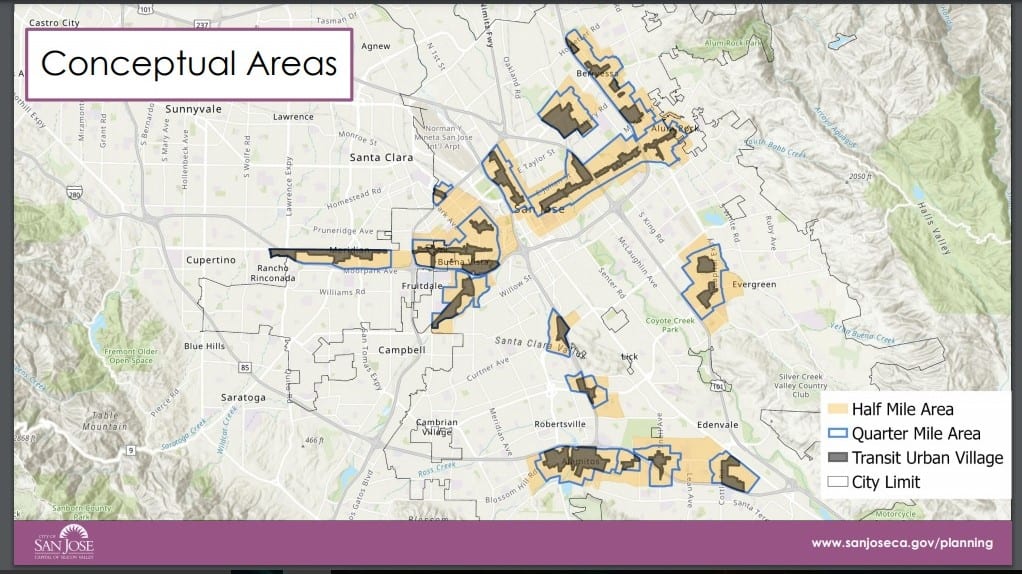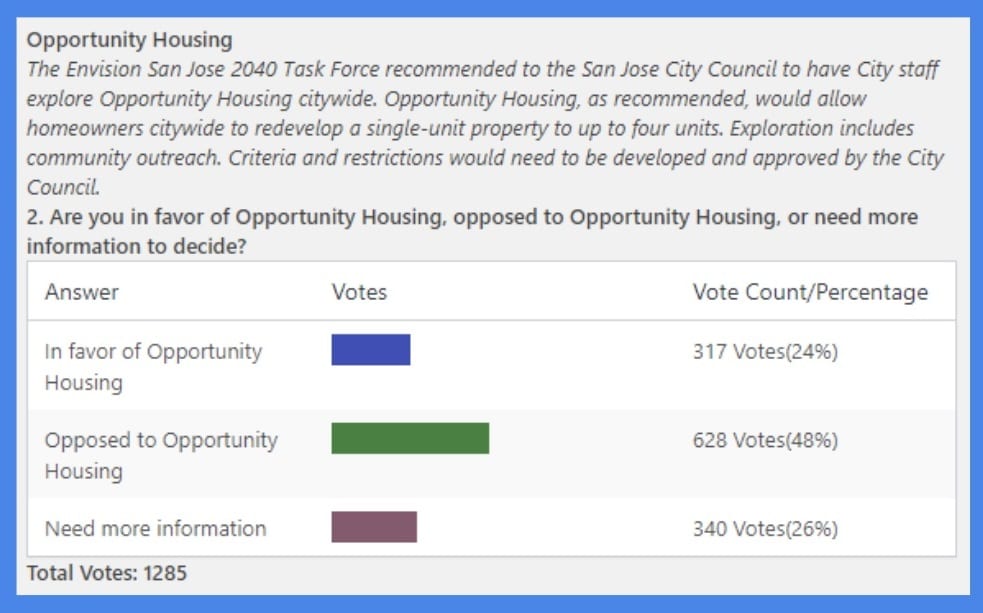Roughly half of San Jose residents surveyed in a new poll oppose an initiative to boost the number of homes allowed in single-family neighborhoods.
According to initial survey results, 48% of San Jose residents are opposed to Opportunity Housing, while 24% of residents support the initiative. Roughly a quarter of residents polled said they need more information, according to the survey.
Opportunity Housing would allow up to four housing units on land currently designated for single-family homes. The vast majority of San Jose’s residential land — 94% — is designed or “zoned” for single-family homes.

The initiative was discussed during San Jose’s quadrennial General Plan Review, in which representatives from across the city convene to discuss changes to city zoning and land use rules. The General Plan Task Force held 10 meetings last year, two of which were dedicated to Opportunity Housing.
Supporters say the measure would boost housing supply to alleviate Silicon Valley’s crippling housing shortage. Opponents call it a threat to suburban, single-family neighborhoods.
At least one task force member requested a delay in voting on the initiative to allow more residents to voice their concerns. Ultimately, the task force voted to recommend the San Jose City Council study a policy that would be enacted citywide.
But while the City Council will mull the initiative this summer, it may be years before an actual policy is enacted.
“They’re not voting for a policy, they’re just giving staff a move forward,” said Mathew Reed, policy manager at housing thinktank SV@Home. “This needs to be an open discussion.”
Reed says the survey results may not reflect the true perspective of San Jose residents, and that results may be skewed in favor of people who are already mobilized against Opportunity Housing.
“It’s not a scientific survey,” Reed said. “We’re at the beginning of educating each other on what some of this might mean… In some ways, that poll reflects a lack of engagement and understanding on this issue.”
Roberta Moore, a San Jose real estate agent who served on the General Plan Task Force, said she supports Opportunity Housing, but thinks the land use changes should occur in areas close to transit. City staff had originally studied an Opportunity Housing policy that would be applied to areas within half a mile of transit hubs.

“They’re taking an unplanned approach to growth and much-needed housing,” Moore said. “Uncontrolled growth leads to urban sprawl… Do we want to become more like L.A.?”
Moore said limiting Opportunity Housing to areas near transit and urban villages — which have both residential and commercial uses — would lessen the negative impacts of new homes.
Though Moore was unfamiliar with the survey, she said she’s not surprised that so many residents are opposed to a citywide implementation of Opportunity Housing.
“I think people don’t understand what it means,” Moore said. “If people knew what it meant, I would expect opposition to be much higher, like 80 to 90 percent.”
Moore said focusing the initiative in areas where residents welcome greater density — such as downtown — would likely garner more support.
“It’s in the urban city where people would expect higher density,” she said. “Downtown, probably the respondents wouldn’t be so against it.”
Proponents of having Opportunity Housing citywide want to reduce the possibility that certain neighborhoods will be overburdened by impacts of greater density. Reed said a citywide implementation of the policy would provide more opportunities for construction across San Jose.
“It generates more housing options at more price points throughout the city, and constraining the geography will just limit that,” Reed said.
He said the restrictions on building created by single-family zoning have increased economic and racial segregation in San Jose.
“Single-family zoning is a policy, it’s a decision that the city has put in place,” Reed said. “Because it’s a decision we made, it’s a decision that we can revisit.”
The citywide survey, sponsored by the East San Jose community organization District 5 United, received more than 1,700 responses as of Thursday, according to the organization’s president Juan Estrada.
In the survey, residents were presented some information on Opportunity Housing, then asked, “Are you in favor of Opportunity Housing, opposed to Opportunity Housing, or need more information to decide?”

As of Jan. 27, 1,285 people responded to the question on Opportunity Housing, with 628 respondents opposed, 317 in favor and 340 needing more information.
San Jose Planning Division Manager Jared Hart said if Opportunity Housing gets the go-ahead from City Council this summer, it would take about two years before the council would consider enacting the policy.
Readers can learn more about Opportunity Housing at the city’s website.
The District 5 United survey will remain open until 9 p.m. Tuesday, according to Estrada, with the final results published the following week. Readers can watch videos of initial survey results on the District 5 United Facebook page.
Contact Sonya Herrera at [email protected] or follow @SMHsoftware on Twitter.



Leave a Reply
You must be logged in to post a comment.